

Interacting or Interfering? Improving Interactions in the Early Years, Open University Press and McGraw-Hill Education
Nottingham, James, 2015. Challenging Learning: theory, effective practice and lesson ideas to create optimal learning in the classroom, Routledge
22.11.2020
Arnold, Cath, 2010. Understanding Schemas and Emotion in Early Childhood: SAGE Publications. How young children learn English as another language. By Opal Dunn, educational consultant and author.
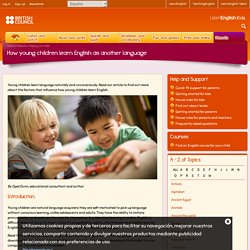
Telephone English Phrases. This is a free sample lesson from the Everyday English Speaking Course.
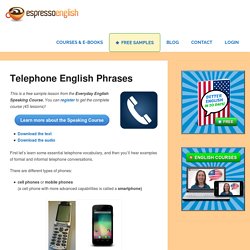
You can register to get the complete course (45 lessons)! Learn more about the Speaking Course. Maths games for KS2 – Recap equivalent fractions in KS2 by getting active. This Y4 lesson by Jon Smedley involves combining maths with physical activity to enthuse pupils about fractions.
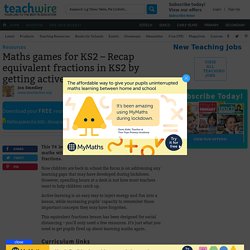
Now children are back in school the focus is on addressing any learning gaps that may have developed during lockdown. However, spending hours at a desk is not how most teachers want to help children catch up. Active learning is an easy way to inject energy and fun into a lesson, while increasing pupils’ capacity to remember those important concepts they may have forgotten. This equivalent fractions lesson has been designed for social distancing – you’ll only need a few resources.
It’s just what you need to get pupils fired up about learning maths again. Curriculum links. LearnEnglish Kids. Primary Plus – English for kids aged 6-12. During the Covid-19 pandemic many of our teaching centres are closed. Classes will continue online and our teachers look forward to bringing their passion and expertise into your home.
Primary Plus, developed by our team of English experts, will spark your child’s imagination, so they can express themselves with confidence that goes beyond their English language skills. Our new approach means your child will have a more rewarding learning experience, getting the most out of learning English at home with a combination of: live online classes with a specialist teacherinteractive independent study, set by your child's teacher to prepare them for the live lesson – all in a safe, easy-to-use learning environment. You will have access to your child’s personal dashboard. Immersive classes with expert teachers to boost English speaking skills. Watch the Learning Time with Timmy video series. Download the apps.
To Help Children Learn, Build on What They Already Know - RAISE READY KIDS. In his brilliant children’s book Fish Is Fish, Leo Lionni tells the story of a fish and tadpole who become best friends.
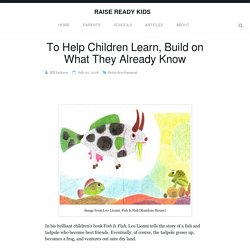
Eventually, of course, the tadpole grows up, becomes a frog, and ventures out onto dry land. One day, the frog jumps back into the pond to see his old friend the fish. “I have seen extraordinary things!” The frog exclaims. “Like what?” The frog tells his fish friend about birds, cows, and people. Of course! Maybe the earth is shaped like a pancake… Assessment for Learning – Education in New Zealand. Observation, Assessment and Planning - Early Years Matters. The EYFS Profile summarises and describes children’s attainment at the end of the EYFS.
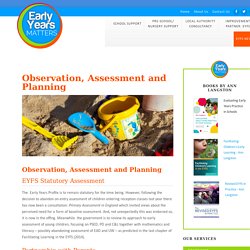
It is based on on-going observation and assessment in the three prime and four specific areas of learning, and the three learning characteristics, set out below: The prime areas of learning: • communication and language • physical development • personal, social and emotional development The specific areas of learning:
Pre-birth to Three: Observation, Assessment and Planning. This ‘Kindness Curriculum’ Is Free And Should Be Used In Every Classroom. Imagine living in a world that valued kindness enough to teach it along with academics. Educators would teach kids to manage their emotions in addition to standard curriculum such as math and science. Sounds pretty amazing, doesn’t it? Well, the Center for Healthy Minds at the University of Wisconsin-Madison has created a free “kindness curriculum” for kids, designed to do just that.
21 of the Best Early Years Books for International Friendship Day. We know that skills like empathy aren’t fully developed until later in a child’s life, which is why there are so many stories on friendship and how to treat people aimed at Early Years. International Friendship Day, then, is a great opportunity to share some of these amazing books with your children. It does, however, fall on Sunday 30 July. So celebrating on the day itself is going to be difficult, doubly so for Reception classes who are on summer holidays. The Key to Effective Classroom Management. It’s a daunting but all-too-common sight for many teachers: A classroom full of rowdy students who are unable to focus on the lesson.
Classroom management techniques may get things back on track, but valuable time has already been lost. Many experienced teachers know that making meaningful connections with students is one of the most effective ways to prevent disruptions in the first place, and a new study set out to assess this approach. In classrooms where teachers used a series of techniques centered around establishing, maintaining, and restoring relationships, academic engagement increased by 33 percent and disruptive behavior decreased by 75 percent—making the time students spent in the classroom more worthwhile and productive. “Strong teacher-student relationships have long been considered a foundational aspect of a positive school experience,” explains Clayton Cook, the lead author of the study and a professor at the University of Minnesota. Relationship reflection form. A 19-Year Study Reveals Kindergarten Students With These 2 Skills Are Twice as Likely to Obtain a College Degree (and They Have Nothing to Do With Reading)
One theory all teachers with disruptive children should know about. Imagine a classroom where children are unable to wait their turn or stay focused on their work.
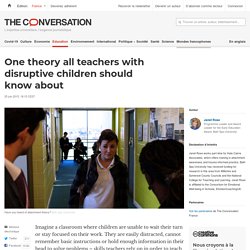
They are easily distracted, cannot remember basic instructions or hold enough information in their head to solve problems – skills teachers rely on in order to teach successfully. These behavioural issues are all examples of problems that can arise from attachment issues – based on the relationship between children and their main caregiver. Attachment theory is now one of the world’s most well-researched theories about human development. Don't Expect Toddlers To Behave Consistently — They Literally Can't.
One day, when my oldest daughter was not quite 2, she wouldn’t sit still to let me change her diaper. Squirrelly and writhing, she made a game out of staying half naked. She wasn’t fussing about it or anything — in fact, she was giggling maniacally. The problem was that we were running late. Can Free Play Prevent Depression and Anxiety In Kids?
Public Media for Northern CA. Public Media for Northern CA. HowLearningHappens. Positive Learning Environment - Primary. Key Person & Attachment - Early Years Matters. The Key Person.
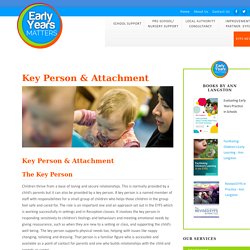
How Are Happiness and Learning Connected? As teachers, we also know that when students' affective filters or defenses are sky high, fight or flight responses will be modus operandi. A room full of defensive behaviors (withdrawn, angry) is a sad, unproductive place to teach and learn. Now let's flip it and take a look at how much more we are able to learn when we are in harmony with the people and things in any given educational environment.
Being in harmony means feeling safe, feeling valued and a necessary part a group, and in this case, a learning community. Guiding Principles for Use of Technology with Early Learners. The thoughtful use of technology by parents and early educators can engage children in key skills such as play, self-expression, and computational thinking which will support later success across all academic disciplines and help maintain young children’s natural curiosity. The Departments recognize that families and early educators have many different options for using technology with early learners.
The Departments believe that guidance needs to reflect the reality that families and early educators have access to apps, digital books, games, video chatting software, and a multitude of other interactive technologies that can be used with young children. Even as new technologies emerge, the Departments believe that these principles apply, though guidance may evolve as more research on this topic is published. Early Literacy. Let’s lose the ADHD label and find the child. When I trained as a primary school teacher 15 years ago, these were some of the words used to describe children with ADHD: ‘Difficult.’
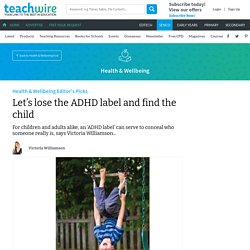
‘Challenging.’ ‘Disruptive.’ There were others, whispered by harassed-looking teachers in the staffroom or concerned parents at the school gates, but none seemed to be positive. When I got my first ‘real’ class to teach, and saw that some of the children came with the dreaded ‘ADHD’ label attached, I approached the new term with butterflies the size of dragons in my stomach. Schemas in Children’s Play - N a t u r e P l a y.
"I Said I Want the Red Bowl!" Responding to… Does my toddler have a short attention span because she won’t sit still for a story? Learning Time with Timmy. Whole Child Development Is Undervalued.
The question is how to make such an approach both systemic and sustainable. Whole Person. Poems for kids. Nursery Rhymes and Songs - BBC Teach. Music and Movement Activities for Toddlers and Preschoolers. 50+ Quick & Easy Kids Crafts that ANYONE Can Make! Songs for kids. Short stories for kids.
How to teach children English using illustrated storybooks. What makes illustrated storybooks such a good resource for teaching young learners of English? The British Council’s Gail Ellis, co-author of a storytelling handbook for primary English language teachers, explains. The Art of Control. Executive function — our ability to remember and use what we know, defeat our unproductive impulses, and switch gears and adjust to new demands — is increasingly understood as a key element not just of learning but of lifelong success. Researchers at the Center on the Developing Child at Harvard University describe executive function as an air traffic control system for the mind — helping us manage streams of information, revise plans, stay organized, filter out distractions, cope with stress, and make healthy decisions.
How to help your child learn English with YouTube videos. Tracey Chapelton, education consultant and materials writer, has some advice for parents of young English learners, whose home language might not be English. Learning Time with Timmy. Practical tips.
By Opal Dunn, educational consultant and author Introduction. Ten ways to support your child’s English-learning at home. Sound Words: Examples of Onomatopoeia. Serve and Return. Effective Teacher-Child Interactions. Quality Interactions Early Years. The Brain-Changing Power of Conversation. MIT Brain Study: Back-And-Forth Talk Key To Developing Kids' Verbal Skills. Carol Dweck: The power of believing that you can improve.
Listening Skills for Staff. A longitudinal investigation of the role of quantity and quality of child-directed speech in vocabulary development. The Power (and Peril) of Praising Your Kids. FAQ: Raising Bilingual Children. Teaching English to learners with Special Educational Needs (SENs) – Myths and realities. Schema and Fairies.
Schemas in Children’s Play - N a t u r e P l a y. "I Said I Want the Red Bowl!" Responding to… Does my toddler have a short attention span because she won’t sit still for a story? Deconstructing Role Play – Provide the Resources, Step Back and Watch Children’s Learning Flourish. ScienceDirect articles 18Nov2020 00 48 32. Symbolic play and language development. Choice page.
The cognitive benefits of play: Effects on the learning brain. Low-cost play ideas & materials. Primary school shake-up to focus on ‘play-led’ learning. Why Movement is Essential in Early Childhood. Play to Learn: Discussion. Play to Learn. How can parents and teachers best educate young children?